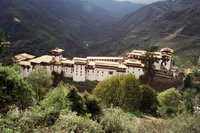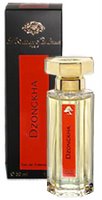 One thing I love about perfume is its ability to take me to a place I’ve never been. Dzongkha is the journey of perfumer Bertrand Douchafour to the tiny land-locked nation of Bhutan, situated between Tibet, India, and China. According to Wikipedia: “The entire country is mountainous except for an 8-10 mile (13-16 km) wide strip of subtropical plains in the extreme south which is intersected by valleys known as the Duars.” Along the mountains, the Bhutans built fortresses called dzongs. Most of them were built in the seventeenth century, to keep Tibet from invading. Many of them still survive, and dzong is considered the main architecture form of Bhutan.
One thing I love about perfume is its ability to take me to a place I’ve never been. Dzongkha is the journey of perfumer Bertrand Douchafour to the tiny land-locked nation of Bhutan, situated between Tibet, India, and China. According to Wikipedia: “The entire country is mountainous except for an 8-10 mile (13-16 km) wide strip of subtropical plains in the extreme south which is intersected by valleys known as the Duars.” Along the mountains, the Bhutans built fortresses called dzongs. Most of them were built in the seventeenth century, to keep Tibet from invading. Many of them still survive, and dzong is considered the main architecture form of Bhutan.
In her review, Colombina says she feels Dzongkha is an introspective fragrance, and I could not agree more. Given the internal, introspective nature of Buddhism, Bhutan’s national religion, and the geography of the nation, it makes sense that this perfume would be closer, quieter than one might expect. The name itself implies strength, both through its origin and the sound: Dzongkha!
And I think that’s where one can be easily fooled by this perfume. For although it feels introspective and thoughtful to the wearer, I wonder if it always leaves others with the same impression. As I left the house this morning, Bob remarked on how I smelled (good). After thinking it over for a minute or two, he told me this fragrance smelled powerful and sophisticated. He mentioned it smelled like something a well-respected female CEO we know might wear. I took this as a compliment and went on my way.
The notes in Dzongkha, depending on where you look, are:
Top: lichee and cardamom
Heart: peony, iris, incense
Base: peony (LusciousCargo)/vetiver (Aedes), iris, incense
The L’Artisan site does not yet list Dzongkha, so they were no help in settling the dispute. I went osMoz and found this:
Top: peony, cardamom
Heart: tea (with milk), incense, cedar, vetiver, spices
Base: Indian papyrus, iris, leather
 Take your pick. I’m assuming the perfumeries got the notes directly off the packaging or from the distributors, but neither of them list leather, and I definitely get a very distinct leather note here. I’m guessing the truth lies somewhere in between, perhaps based on how it mixes with your skin. Different reviewers have had very different impressions of this scent.
Take your pick. I’m assuming the perfumeries got the notes directly off the packaging or from the distributors, but neither of them list leather, and I definitely get a very distinct leather note here. I’m guessing the truth lies somewhere in between, perhaps based on how it mixes with your skin. Different reviewers have had very different impressions of this scent. The iris softens the incense, keeping it very dry but not powdery. The peony sweetens it, and vetiver makes it slightly pungent through the middle, although it disappears later on for me. The dry-down is all milky floral leathery incense. I find it strikingly pretty, and although this is a very thoughtful, meditative sort of scent, I understand also how another person might find it powerful. It has a quiet confidence, a tall tower wall protecting the soft introspective side, the way the dzong walls protect the courtyards, temples, and monks’ houses inside.
*photos and facts from Wikipedia